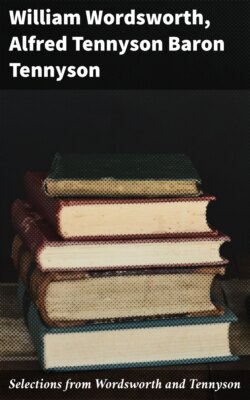Читать книгу Selections from Wordsworth and Tennyson - William Wordsworth - Страница 11
На сайте Литреса книга снята с продажи.
(WITH THE SONNETS TO THE RIVER DUDDON, AND OTHER POEMS IN THIS COLLECTION, 1820).
ОглавлениеThe minstrels played their Christmas tune
To-night beneath my cottage-eaves;
While, smitten by a lofty moon,
The encircling laurels, thick with leaves,
Gave back a rich and dazzling sheen, 5
That overpowered their natural green.
Through hill and valley every breeze
Had sunk to rest with folded wings;
Keen was the air, but could not freeze,
Nor check, the music of the strings; 10
So stout and hardy were the band
That scraped the chords with strenuous hand:
And who but listened?—till was paid
Respect to every Inmate's claim:
The greeting given, the music played, 15
In honor of each household name,
Duly pronounced with lusty call,
And "Merry Christmas" wished to all!
O Brother! I revere the choice
That took thee from thy native hills; 20
And it is given thee to rejoice:
Though public care full often tills
(Heaven only witness of the toil)
A barren and ungrateful soil.
Yet, would that Thou, with me and mine, 25
Hadst heard this never-failing rite;
And seen on other faces shine
A true revival of the light
Which Nature and these rustic Powers,
In simple childhood, spread through ours! 30
For pleasure hath not ceased to wait
On these expected annual rounds;
Whether the rich man's sumptuous gate
Call forth the unelaborate sounds,
Or they are offered at the door 35
That guards the lowliest of the poor.
How touching, when, at midnight, sweep
Snow-muffled winds, and all is dark
To hear—and sink again-to sleep
Or, at an earlier call, to mark, 40
By blazing fire, the still suspense
Of self-complacent innocence;
The mutual nod—the grave disguise
Of hearts with gladness brimming o'er;
And some unbidden tears that rise 45
For names once heard, and heard no more;
Tears brightened by the serenade
For infant in the cradle laid.
Ah! not for emerald fields alone,
With ambient streams more pure and bright 50
Than fabled Cytherea's zone
Glittering before the Thunderer's sight,
Is to my heart of hearts endeared
The ground where we were born and reared!
Hail, ancient Manners! sure defence, 55
Where they survive, of wholesome laws;
Remnants of love whose modest sense
Thus into narrow room withdraws;
Hail, Usages of pristine mould,
And ye that guard them, Mountains old! 60
Bear with me, Brother! quench the thought
That slights this passion, or condemns;
If thee fond Fancy ever brought
From the proud margin of the Thames,
And Lambeth's venerable towers, 65
To humbler streams, and greener bowers.
Yes, they can make, who fail to fill
Short leisure even in busiest days;
Moments, to cast a look behind,
And profit by those kindly rays 70
That through the clouds do sometimes steal,
And all the far-off past reveal.
Hence, while the imperial City's din
Beats frequent on thy satiate ear,
A pleased attention I may win 75
To agitations less severe,
That neither overwhelm nor cloy,
But fill the hollow vale with joy!
Christopher Wordsworth was born at Cockermouth in Cumberland on June 9th, 1774. He received his early education at Hawkshead Grammar School and in 1792 entered Trinity College, Cambridge, as a pensioner. He graduated in 1796 with high honours in mathematics, and in 1798 was elected a fellow of his college. He took his M.A. degree in 1799 and was awarded the degree of Doctor of Divinity in 1810. While at Cambridge Christopher had been tutor to Viscount Canterbury, who introduced him to his father, at that time Bishop of Norwich. Through the good offices of the Bishop he was appointed to the rectory of Ashby, Norfolk, and thus, with prospects settled, he was enabled to marry. On the appointment of the Bishop of Norwich to the Archbishopric of Canterbury he was appointed domestic chaplain to the Archbishop. Subsequently in 1816 he was appointed rector of St. Mary's, Lambeth, the living he held at the time the poem in the text was written.
In 1820 Christopher was made Master of Trinity College, Cambridge, a position he held until his resignation in 1841. He died at Buxted on February 2nd, 1846. "He was an earnest and deeply religious man; in some respects a high churchman of the old school, but with sympathy for whatever was good and noble in others. In politics he was a staunch Conservative."
15. THE GREETING GIVEN, THE MUSIC PLAYED. Till the greeting had been given and the music played.
17. Attributive to "name" (l. 16.)
18. Explain the construction of "wished."
50. AMBIENT=winding.
51. CYTHEREA'S ZONE. The goddess Venus was named Cytherea because she was supposed to have been born of the foam of the sea near Cythera, an island off the coast of the Peloponnesus. Venus was the goddess of love, and her power over the heart was strengthened by the marvellous zone or girdle she wore.
52. THE THUNDERER. The reference is to Jupiter, who is generally represented as seated upon a golden or ivory throne holding in one hand the thunderbolts, and in the other a sceptre of cypress.
55–60. Suggest how this stanza is characteristic of Wordsworth.
65. LAMBETH'S VENERABLE TOWERS. Lambeth Palace, the official residence of the Archbishop of Canterbury, is on the Thames. Wordsworth's brother Christopher, afterwards Master of Trinity College, was then (1820) Rector of Lambeth.
